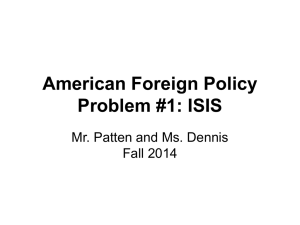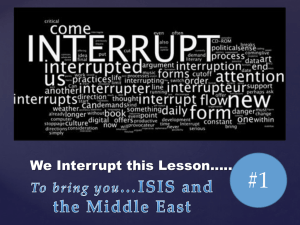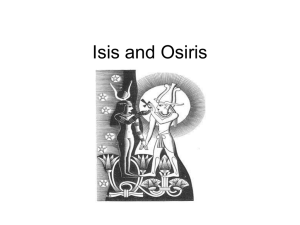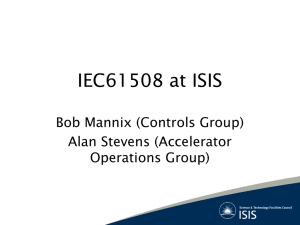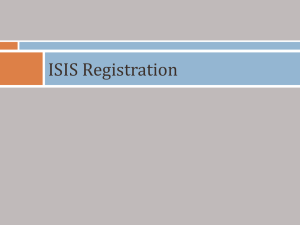ISIS and The Middle East
advertisement
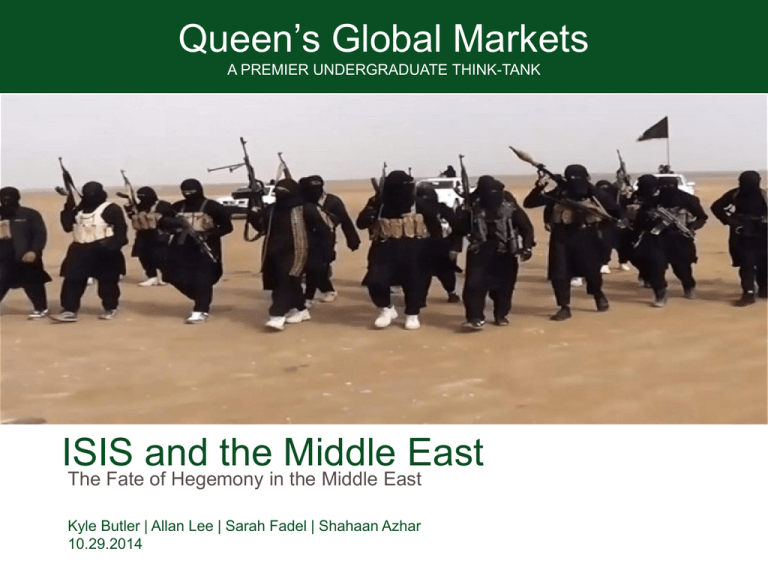
Queen’s Global Markets A PREMIER UNDERGRADUATE THINK-TANK ISIS and the Middle East The Fate of Hegemony in the Middle East Kyle Butler | Allan Lee | Sarah Fadel | Shahaan Azhar 10.29.2014 Agenda 1. Religion and the War on Terror 2. Current ISIS Operations 3. Key Players: strategic interests in the Middle East 4. Conclusions & Predictions QGM 2 Geographic Breakdown of Ideologies Religious discrepancies in the Middle East insinuate conflict Source: The Shia Revival QGM 3 The War on Terror: U.S.’ Failure The United States made a number of decisions which resulted in its failure in the “war on terror” Ignoring Key Players The US failed to deal with two key players during the climax of the war on terror: Saudi Arabia and Pakistan Donors from Saudi Arabia have contributed the majority of funds to Sunni terrorist groups worldwide In addition Bin Laden was a member of the Saudi Ineffective Iraqi Government The US bears a large amount of responsibility for political turmoil that has occurred in Iraq US put a tremendous amount of pressure on Baghdad to complete its transformation to a inclusive democratic government American officials including Vice President Joe elite as well his father was an associate of the Saudi Biden and Brett McGurk supported Maliki over monarch other candidates Pakistan’s Inter-Services Intelligence assisted in the The Obama administration had been pushing out evacuation of thousands of top commanders of both Maliki since June which resulted in another the Taliban and Al Qaeda rushed appointment of al-Abadi The US failed to confront both of these players because they are important American allies America has tried to rush the Iraqi political process which has resulted in the poor results Saudi Arabia is a key market for American arms as well a key source of oil Source: Huffington Post QGM 4 Iraq’s Leadership Will Iraq’s new leadership result in change? Saddam Hussein Nouri al-Maliki Committed vast atrocities by Maliki was elected, largely with using chemical weapons backing from the US, with the against Kurds and Shia citizens goal of restoring peace during his thirty year tenure between the Iraqi factions Continual marginalization of New PM as mounting pressure caused Maliki to resign Abadi has the incredibly difficult task to rebuild trust between the Government, Sunnis, and Kurds Kurdish and Shia population occasion to seek revenge fueled bitter animosity between against the Sunni brutalities by various sects handing over the majority of fairly extreme Dawa party, his legislative power to Shias political stance during his Deposition created an opportunity for Iraqi Shias to This has insinuated the current Although he belongs to the tenure was generally more gain greater control of the crisis as ISIS gains support moderate than those of both country from enraged Sunnis his predecessor and his party Picture of Hussein Source: BBC Instead, Maliki took the Haider al-Abadi Picture of Hussein QGM 5 ISIS Background Beginnings of the world’s most radical extremist organization ISIS Origins Originally founded as Al Qaeda’s Iraqi offspring, but has separated due to differences in ideology regarding use of brutality and force After gaining much influence in the early 2000s, successful American lead strikes as well as local backlash for ISIS brutality had all but decimated ISIS forces and support As American troops withdrew, ISIS focused on prison breaks to free and recruit terrorists and Hussein’s ranks of experienced ex-commanders Vision of establishing an Islamic State based upon radical interpretation of Islam among Sunni majority districts among Iraq, Syria, and beyond Recent Uprising Took advantage of civil war in Syria to recruit members and promote extremist ideology Victories against Syrian government provided funding, weapons, and battle seasoned extremists that allowed ISIS to confront Iraqi military Source: Wikipedia ISLAMIC STATE OF IRAQ AND THE LEVANT QGM 6 ISIS Conquest The speed and ruthlessness of the Iraq Northern Offensive caught the world off guard Source: (Map) US Officials, Institute for the Study of War, The Long War Journal QGM 7 ISIS Conquest The speed and ruthlessness of the Iraq Northern Offensive caught the world off guard Iraq Northern Offensive After capturing the major city of Fallujah in January, the Iraqi government halfheartedly fought back with little success In June, 800 ISIS militants captured Mosul overnight defeating 30,000+ Sunni soldiers ISIS overran Syrian and Iraqi military bases as well massacred villages at a time, destroying the remaining confidence in Iraqi soldiers ISIS took advantage of panic to attack multiple cities while Iraqi army was in disarray Map of ISIS conquests on June 23, with the majority of gains coming after June 5th Mosul attack Source: (Map) US Officials, Institute for the Study of War, The Long War Journal QGM 8 ISIS Power Unprecedented military and financial resources for a terrorist organization Areas of Strength Many battle hardened extremists with experience fighting against Americans and Assad Fast moving strikes in parallel with suicide attacks are unpredictable tactics that are hard to fend against Powerful social media campaign that instills fear in opponents and attracts recruits that include foreign jihadists Professionally designed propaganda focuses on marginalization and oppression of Sunnis by Shia and has been used effectively to recruit and gain local support Key Resources Richest terrorist organization with over $1 billion Large cache of US military arms, mortars, and armored vehicles captured from fleeing Iraqi army Steady stream of revenue from illicit business activities o I.e. Smuggling oil and gas, selling electricity to Syrian government, collecting tax and ransom o Many new recruits were attracted to ISIS due to high wages that few jobs could provide o Money used to buy black market weapons o Extensively uses videos, magazines, and news to promote ideology Source: (Map) Aaron Y. Zelin, International Centre for the Study of Radicalisation and Political Violence QGM 9 Current ISIS Situation Halting ISIS and the counterattack US Action Counter Attack 1: Air Strikes Obama’s ISIS Strategy Main Defense Against ISIS Short Term Repeatedly stressed “no boots on ground” policy and Air strikes has worked effectively in repelling large stated that the conflict can only be resolved by Iraqis US and allies have sent over military advisors and launched coalition airstrikes against ISIS targets Freeing ISIS held territory will be a long term endeavor driven mainly by Iraqi forces scale ISIS attacks Pipelines and refineries targeted to stop main source of ISIS cash flow Targets also include heavy artilleries and vehicles that have delivered ISIS game changing firepower Counter Attack 2: Local forces Long Term Solution (6-12 months) Iraqi army is mainly on the defensive but should hold out well since the majority of Iraqi held territory is now of Shia majority with loyal soldiers and tribes Structural changes within the army will be required to fix corruption, poor training, and moral before launching offensive against ISIS US currently arming and training fiercely patriotic Kurdish and moderate Syrian rebels to fight ISIS Source: Foreign Policy, Wikipedia, Vox.com QGM 10 Turkey Why the NATO nation is unwilling to fight ISIS Turkey’s Foreign Policy Despite public disapproval, privately Turkey stands to benefit from ISIS’ existence Turkey will refuse to cooperate with NATO requests for military support and access to its military base since ISIS allows Turkey to absolve itself temporarily from its longstanding troubled relationship with the Turkish Kurds, including the terrorist organization PKK (Kurdish Worker’s Party) Turkey may help fight ISIS if a no-fly zone is established against the Syrian regime, which would eliminate Assad’s strategic air power advantage over rebels We believe that Turkey’s desire to stifle Kurdish power outweighs its desire to see the Assad regime topple and as such, Turkey will continue to abstain from intervening in the fight against ISIS Source: Foreign Policy Turkey has been criticized for its role as a bystander QGM 11 Syria Opportunistic extremists intensify the battle for supremacy A blessing in disguise The power vacuum and armed conflict allowed ISIS to easily capture vast territory in Syria. There has been widespread conflict between various Sunni based rebel groups and ISIS, although they share the same goal. The Syrian government will refrain from directly fighting ISIS. Instead it will conserve its resources and wait for international forces to weaken the group. As the international coalition attacks ISIS, the Syrian government can consolidate its troops and eliminate other Sunni groups vying for control Ultimately, the Syrian government will be an unlikely beneficiary of the current conflict Source: The Economist, BBC QGM 12 Saudi Arabia The Gulf’s most powerful country remains fearful of reprisal Current Operations We believe that the Kingdom will side with Iran for the first time in its diplomatic history, since ISIS directly undermines the Islamic beliefs that the Saudi state are built upon The KSA has been funding Sunni factions to fight against Bashar Al- Assad’s Shia-led government for the past three years in Syria without much success Future Actions The kingdom will continue to support various groups that seek to defeat the ISIS However, Saudi will refrain from directly supplying military, logistical, or intelligence-based resources and assets out of apprehension regarding repercussions from ultra-conservative nationals Long-term effects Saudi Arabia will only remain impartial with Iran until the conflict is over. Following the demise of ISIS, it will once again resume its plan to debilitate the Shia power Riyadh will also devise a strategy to gain control of Shia-ruled Syria in order to prevent the Iranian alliance from forming The Saudi government sees this as an opportunity to consolidate the region and extend their powerful influence Source: Financial Times, Huffington Post QGM 13 Iran An unusual alliance convolutes an already complex situation Iran’s Plan for a Shia Nexus Iran’s mission is to create an alliance between Shia-majority countries so that it challenge regional powers As a result of Iran’s long-term plans, Iran was the first country to aid Iraq against the ISIS assault Iran will continue to quell the extremist threat in Iraq using all means necessary. It will also continue to support the Syrian government against Sunni rebel groups Iran will likely appear stronger after this conflict. By helping get rid of extremist Sunni rebel groups in both Iraq and Syria, it will be in a position to further challenge Saudi Arabia as the dominant player in the region and will move closer to creating a Shia alliance. Source: Wall Street Journal, The Star QGM 14 The United States in the Middle East America continues its decade-long struggle to establish stability given its deteriorating status as the world’s Moral Leader Expected Foreign Policy The U.S. Juggling Act We believe that American policy will be directed at finding a U.S.-friendly government, whether democratic or not, especially since most democratically elected or militaristically enforced governments in the region perpetuate extremist Islamic regimes America will attempt to leverage its diplomatic relations with key players Iran, Israel and Saudi Arabia to weaken the Assad Regime, and ultimately remove the disorder that fuels ISIS’ operations QGM 15 Resolution of the Iranian Nuclear Crisis The United States must work with regional players to resolve the Iranian nuclear program How to Defeat ISIS Survival contingent on Instability ISIS can only survive as long as there is disorder amongst its neighbors, but once that is resolved, the new status quo will defeat it ISIS itself has no ability to create the new status quo Iranian Nuclear Crisis Resolution of Iranian nuclear issue will be fundamental to order Iranians feel threatened by the U.S. and Saudi Arabia, so they support Assad in Syria; they must feel secure before abandoning Assad regime Reconstitution of Iraq and Syria Feasibility The U.S. continues to be the global hegemon U.S. can use its influence to achieve regional order The U.S. has already made unprecedented moves towards accepting the Iranian Nuclear Program Obama administration has engaged in serious and positive discussions with Iran American Policy can reasonably impose a loose resolution between Israel, Saudi Arabia, and Iran Unlike other issues such as the PalestinianIsraeli conflict, Israel, Saudi Arabia and Iran seem willing to cooperate on ISIS In general, the costs of enforcing undemocratic regimes weaken groups like ISIS over time. History is on Democracy’s side in the long term A reconstituted Iraq and Syria will be strong enough to topple ISIS and be more successful at dealing with similar groups in the future QGM 16
